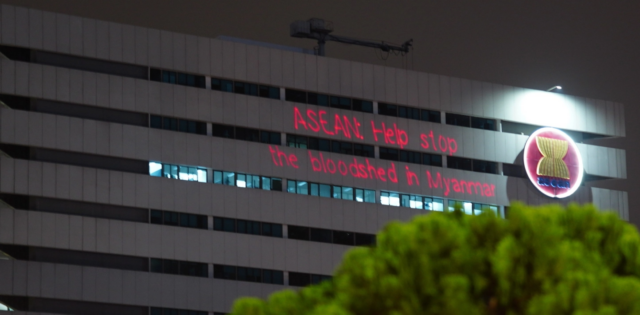Myanmar: ASEAN approach requires a reboot to end horrific crimes by the Myanmar military


© Amnesty International Indonesia
As the Association of Southeast Asian Nations (ASEAN) marks its 55th anniversary today, Amnesty International urges the regional bloc to acknowledge the failure of its five-point plan published in April 2021 to end the violence and increasing human rights violations in Myanmar.
“ASEAN must prove it is not a toothless body but acts decisively to hold the Myanmar military to account for its atrocious human rights violations. The military has decades of blood on its hands and will continue to trample on the lives and rights of millions of people in Myanmar if it is not made to face the consequences of its crimes,” said Ming Yu Hah, Amnesty International’s Deputy Regional Director for Campaigns.
“In the face of the continuing atrocities – including executions following unfair trials, extrajudicial killings and torture committed by the Myanmar military – ASEAN must swiftly adopt a more robust course of action so that military leaders end the escalating violent repression they have unleashed since the February 2021 coup.”
To reinforce this message, Amnesty International projected the words “ASEAN must act now!” onto the building of the ASEAN headquarters in Jakarta on Monday.
Since February 2021, the Myanmar military has systematically cracked down on tens of thousands of peaceful protesters nationwide, forcing 700,000 people from their homes, killing over 2,000 people and arresting almost 15,000 individuals.
“For ASEAN to retain its credibility, it must change its approach to help end the country-wide bloodshed in Myanmar. ASEAN, collectively as a bloc and as individual member states, must also push for justice and accountability in Myanmar. It is imperative that ASEAN plays a constructive rather than obstructionist role and encourages other members of the international community to maximize pressure on the Myanmar military,” Ming Yu Hah said.
“We urge ASEAN to demand immediate action from the Myanmar military, including the release of all those who are arbitrarily detained. ASEAN must also address other urgent needs, including committing to the non-refoulement of refugees or anybody else fleeing violence in Myanmar, facilitating desperately needed humanitarian assistance, and adding its voice to calls for a global arms embargo.”
Amnesty International’s Indonesia office was joined by a number of Indonesian civil society groups on Monday as the message to ASEAN was projected onto the organization’s Jakarta HQ.
During an ASEAN summit in Jakarta in 2021, Amnesty International reminded Indonesia of its obligation under international law to investigate Senior General Min Aung Hlaing and other Myanmar military officials on credible allegations of responsibility for crimes against humanity in Myanmar.
“Myanmar’s military has made a mockery of ASEAN’s ‘Five-Point Consensus’ to reduce violence following the country’s military coup in 2021,” Ming Yu Hah said.
“Instead of implementing the agreement, Myanmar’s military has continued to perpetrate grave human rights violations against the population of 54 million.”
In the latest example of its abusive treatment of the Myanmar people, the military executed four men in July after grossly unfair trails – the first executions since the 1980s – with more than 70 people on death row post-coup.
In research published in April, Amnesty International recorded increasing state repression in Myanmar, including shootings and beatings against many peaceful protesters. Testimonies indicated that plainclothes police officers are disguising themselves as fruit sellers and trishaw drivers to spy on anyone daring to express dissent. In retaliation against activists, the military has raided their homes and arrested their family members.
A report by Amnesty International published in July showed that the Myanmar military is committing war crimes by laying antipersonnel landmines on a massive scale in and around villages in Kayah (Karenni) State.
A further report published by Amnesty International on 2 August documented the Myanmar military’s use of torture tactics in detention, including inflicting sexual and gender-based violence and psychological torture. Amnesty’s investigation found that the Myanmar military also committed enforced disappearances and subjected detainees to torture and other ill-treatment in detention centres.

